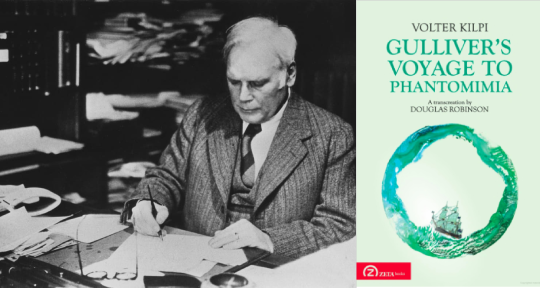Gulliver’s Voyage to Phantomimia by Volter Kilpi, in a transcreation from the Finnish by Douglas Robinson, Zeta Books, 2020
All reference sources on Volter Kilpi (1874–1939), Finland’s most renowned prose fiction experimentalist from the early twentieth century, will unanimously cite his novel In the Parlour at Alastalo (1933)—with its nine hundred pages conveying just about six hours of story time—as the writer’s main masterpiece. Difficult reading in the original, this modernist tour de force is also deemed untranslatable, with only a Swedish version available to a non-Finnish audience. As a result, Kilpi’s fame does not traverse lingual borders easily, and his reputation as James Joyce’s literary peer is established by proxy: most of us would just take a Finnish professor’s word for it. The arrival of Douglas Robinson’s English “transcreation” of Kilpi’s posthumously published last novel, Gulliver’s Voyage to Phantomimia (1944), indicates a seminal challenge to this status quo.
The original Kilpi novel pretends to be the Finnish-language publication of an English manuscript that a Finnish librarian (presumably, Kilpi himself) happens to discover among old manuscripts in stock, “caked with dust.” It turns out to be Lemuel Gulliver’s own account of the fifth round of his exciting travels, which Kilpi “translates” for his local readership’s convenience. Kilpi began working on the novel in 1938 and wrote twenty-five chapters before suffering a debilitating stroke, but articulated an approximation of his plans for the remainder. Taking up this playful design of a sequel to Jonathan Swift’s 1727 classic, Robinson then develops and intensifies it: not only does he translate the Kilpi text into a stylized version of Swiftian English, with eighteenth century spellings and phrasings to make it resemble the “original” Gulliver manuscript, but he also supplies it with a bunch of metafictional “Introductory Texts” and an ending—another seventeen chapters, an intratextual sequel to Kilpi’s intertextual one. READ MORE…


